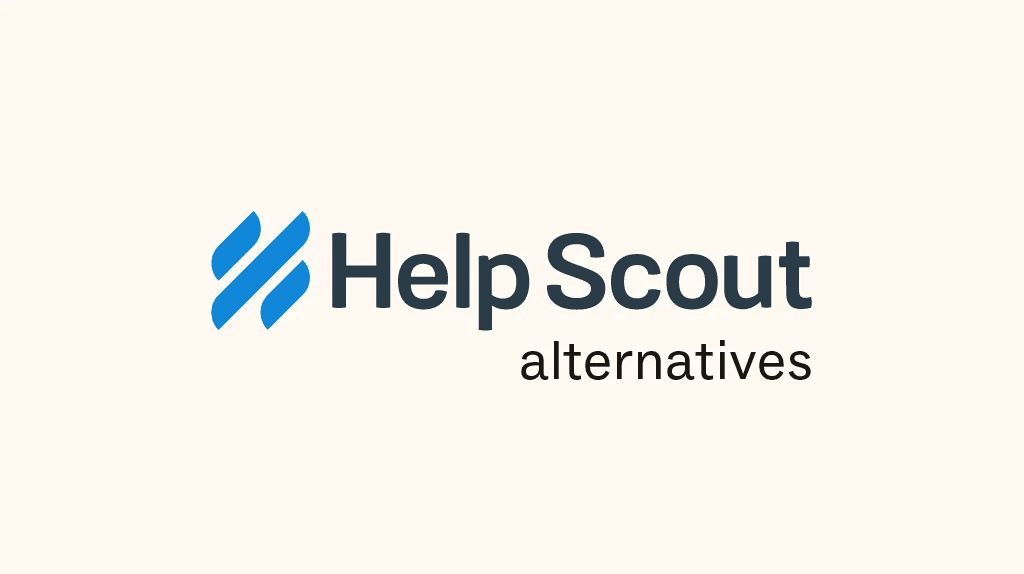Top 5 Alternatives to HelpScout for Growing SaaS Businesses Connect
Written by
Sanjay M.
on
Aug 28, 2024

Introduction
As your SaaS business scales, so do the demands on your customer support team. The right support tool can significantly impact your ability to deliver exceptional customer service. While HelpScout has been a go-to solution for many, growing businesses often search for alternatives that better align with their evolving needs. This explores five alternative support tools that better fit your expanding SaaS company.
Why Consider Alternatives to HelpScout?
HelpScout offers a solid foundation for customer support, but it’s not always the perfect match for every business, especially those experiencing rapid growth. Here are a few common reasons companies start looking for alternatives:
Customization Needs: As your workflows become more complex, you might find HelpScout’s customization options limiting.
Scalability Concerns: What starts as an affordable solution can quickly become cost-prohibitive as your team and customer base grow.
Feature Gaps: HelpScout might lack certain crucial features for your business, such as advanced automation or specific integrations.
Criteria for Choosing the Right Support Tool
Before diving into the alternatives, it’s essential to establish the criteria that matter most when selecting a support tool:
Customization & Flexibility: The ability to tailor the platform to your unique workflows.
Cost-Effectiveness: A pricing structure that scales with your business without breaking the bank.
Scalability: A tool that can grow alongside your business, handling increased volume without a hitch.
Ease of Use: Intuitive interfaces that make life easier for your support team and customers.
Integration Capabilities: Seamless integration with your existing tech stack to avoid disrupting your operations.
The Top 5 Alternatives to HelpScout
1. Connect
Overview: Connect is an open-source support system specifically designed for SaaS companies. It’s built to be highly customizable, allowing businesses to adapt it to their specific needs.
Key Features: Full customization, community-driven development, flexibility in hosting and integration.
Best For: Agile teams that need a scalable, customizable support tool without the constraints of a proprietary system.
Pricing: Being open-source, Connect is free to use, with costs primarily associated with hosting and maintenance.
2. Zendesk
Overview: Zendesk is a comprehensive customer support platform known for its robust feature set and extensive integrations.
Key Features: Multi-channel support, advanced automation, extensive reporting, and analytics.
Best For: Larger businesses with complex customer support needs require a highly scalable solution.
Pricing: Zendesk offers scalable pricing tiers but can be expensive, particularly for smaller teams or startups.
3. Freshdesk
Overview: Freshdesk is a cloud-based customer support tool emphasizing ease of use and quick deployment.
Key Features: Omnichannel support, AI-driven automation, customizable workflows, and a user-friendly interface.
Best For: Businesses looking for a straightforward, user-friendly platform that offers robust features without the complexity.
Pricing: Freshdesk provides affordable plans, including a free tier for small teams, making it accessible for businesses of all sizes.
4. Intercom
Overview: Intercom is a customer messaging platform that combines support, marketing, and sales into one powerful tool.
Key Features: Real-time messaging, chatbots, automated workflows, and in-app support.
Best For Companies that prioritize real-time customer engagement and want to integrate support with their sales and marketing efforts.
Pricing: Intercom’s pricing is higher, reflecting its extensive feature set and focus on customer engagement.
5. Groove
Overview: Groove is a simple, straightforward help desk solution for small to mid-sized businesses.
Key Features: Shared inbox, knowledge base, ticketing system, and easy-to-use interface.
Best For Businesses looking for a cost-effective, no-frills support tool that covers the basics without unnecessary complexity.
Pricing: Groove offers competitive pricing, especially appealing to startups and smaller teams looking for value.
Comparing the Alternatives
To help you decide which tool might be the best fit, here’s a quick comparison of the key features and pricing of these alternatives:
How to Choose the Right Alternative for Your Business
Selecting the right customer support tool depends on understanding your unique needs. Here are some steps to guide your decision:
Assess Your Needs: Consider your business’s specific requirements, including team size, customer expectations, and future growth plans.
Trial Periods: Take advantage of free trials to get a hands-on feel for each tool before committing.
Long-Term Considerations: Consider how the tool will scale with your business and whether it offers the flexibility you’ll need as you grow.
Conclusion
As your SaaS business evolves, so should your customer support tools. While HelpScout is a solid option, several alternatives might offerbetter features, pricing, and scalability for your growing needs. Whether you’re looking for an open-source solution like Connect or a more comprehensive platform like Zendesk, the right tool is out there for you.